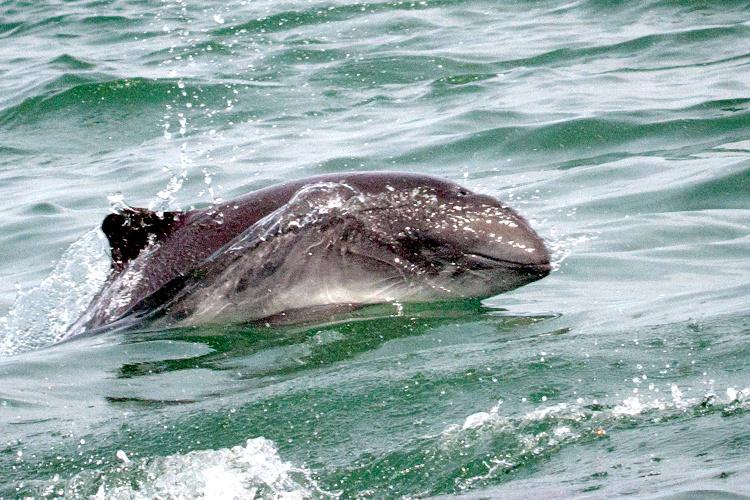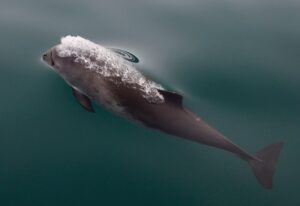

There are at least two distinct populations of harbor porpoises in Southeast Alaska waters, and one of them appears to be particularly vulnerable to deaths from entanglements in commercial fishing gear, according to newly released information from National Oceanic and Atmospheric Administration scientists.
The breakdown of Southeast Alaska’s porpoises into separate northern and southern populations contrasts with current management, which treats the region’s porpoises as a single population.
The more precise population definition, which is based on DNA analysis and other information, could affect management of Southeast Alaska’s commercial gillnet salmon fisheries.
At issue, said Alex Zerbini, lead author of both the NOAA report on genetics and related information and a recent study on population size, is bycatch: the accidental drownings of porpoises tangled in fishing nets.
“Either they’re going for the fish or sometimes they’re just traveling, and they can’t see the nets,” said Zerbini, who is with NOAA’s Alaska Fisheries Science Center and the University of Washington. “They hit the nets and they die.”
NOAA manages porpoises under the Marine Mammal Protection Act, and human activities like fishing are regulated according to that act’s conservation requirements.
The northern population, estimated at 1,619 animals swimming in Glacier Bay, Icy Strait and Cross Sound, appears to be resilient to current levels of bycatch, a term describing when fishers catch species other than those they’re targeting. But the southern population, swimming around Zarembo Island and Wrangell and estimated at 890 animals, might be already subjected to more bycatch than it can absorb.
The study by Zerbini and his colleagues, published in the journal Frontiers in Marine Science, quantified population estimates and “potential biological removal,” or the levels of bycatch deaths that each group could withstand. That came out to losses of 12 animals a year for the northern population and 6.1 animals a year for the southern population.

Current bycatch-caused deaths for the southern population were calculated at 7.4 animals per year, beyond the danger threshold. The estimated losses happening in the northern population, however, came out to only 5.6 animals a year, below that threshold.
Exactly how much bycatch of porpoises is currently happening is unclear. A five-year NOAA report released in August documented only two cases from 2016 to 2020.
However, documented reports could miss actual cases. The gillnet harvests are not monitored through any mandatory observer program. A pilot program conducted by NOAA in 2012 and 2013, the Alaska Marine Mammal Observer Program, was able to monitor numerous interactions between the fleet and porpoises.
It’s possible that fishing crews do not even see dead porpoises caught in nets, Zerbini said.
The idea is that the porpoises in northern and southern waters of Southeast Alaska emerged from varying population trends, he said. If it were a single population, the trends would be similar, he said.
DNA analysis to confirm the difference was difficult. Typically, DNA analysis of marine mammals is done through analysis of tissue samples. But porpoises are so elusive that scientists turned to “environmental DNA” – samples of water into which the porpoises are frequently shedding small bits of skin, Zerbini said.
Meanwhile, there appears to be a third, completely different population of porpoises swimming in the outer waters around Yakutat. Much less is known about those animals, Zerbini said. “It is very likely that there are multiple different stocks within that unit, but we just don’t have the data to demonstrate that,” he said.
The emerging demographic pattern for Southeast Alaska fits with demographic patterns for porpoise elsewhere, where populations tend to range in small areas, he said. There are multiple defined population stocks in waters off California, for example.
Any formal determination separating northern and southern Southeast Alaska porpoise population stocks would be done through NOAA’s stock assessment review process. A draft assessment is pending, and there will be a public comment period before any final assessment is released, said Maggie Mooney-Seus of NOAA’s Alaska Fisheries Science Center.
Alaska Beacon is part of States Newsroom, a network of news bureaus supported by grants and a coalition of donors as a 501c(3) public charity. Alaska Beacon maintains editorial independence. Contact Editor Andrew Kitchenman for questions: info@alaskabeacon.com. Follow Alaska Beacon on Facebook and Twitter.














